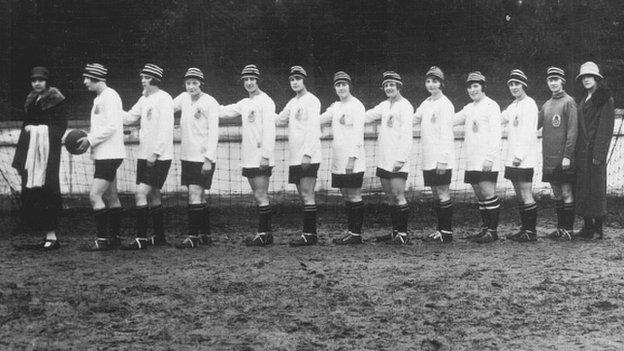Katie Taylor's professional journey: Key moments in the history of female sport
- Published
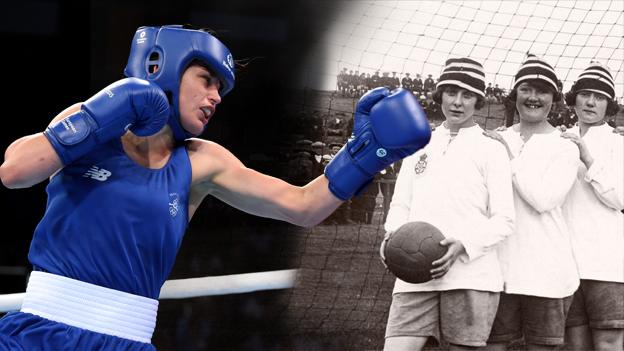
Boxer Katie Taylor and women's football team Dick Kerr's Ladies
When Katie Taylor steps into the ring on Saturday night for her second professional fight as she takes on Brazil's Viviane Obenauf, she will be blazing a trail for female boxing in Ireland and Britain.
This is something the popular Taylor, who won Olympic gold for Ireland in London 2012, is very conscious of.
"When I first dreamt of Olympic gold, female boxing was practically unknown, but it is now as much part of the fabric of the Olympics as its male counterpart," said the 30-year-old five-time world champion.
"Now I want to do the same for the professional sport."
But not only is this a significant moment for female boxing, it also represents the latest milestone in the growth and development of female sport.
What have been some of the key steps along the way?
Olympic changes
Female sport has certainly come a long way since the first ancient Olympic games back in 776 BC, when women were not allowed to compete, and many were allegedly not even permitted to watch the games take place.
Women were not permitted to participate in the first modern games in 1896, but were allowed to compete in a small selection of sports from the Paris games of 1900 onwards. In the modern era female participation has steadily grown, with women's boxing making its debut at London 2012, where Taylor carried Ireland's flag at the opening ceremony.
The beautiful game
Women's football came to prominence during World War One following the suspension of the Football League at the end of the 1914-15 season.
Any men fit enough to play football had been sent to fight and women took their jobs back at home. For women working in factories across the country, informal games of football became a popular pastime.
Ladies' football quickly became more formalised, with teams emerging from the munitions factories and games being used to raise money for charities.
The most successful team was Dick Kerr's Ladies FC from Preston. In 1920 a Boxing Day match against St Helen's Ladies was watched by 53,000 spectators at Goodison Park.

Dick Kerr's Ladies were undefeated British champions during the 1920-1921 season
When the war ended, factories began to close and many women returned to domestic life.
Football was no longer seen as a health benefit and in December 1921 the FA called on clubs belonging to the associations "to refuse the use of their grounds for such matches". The ban ended the short-lived 'golden era' of women's football.
In 1971 the FA lifted the ban and Uefa recommended the women's game should be taken under the control of the national associations in each country.
The inaugural women's World Cup took place in 1991. The 2012 women's football Olympic final at Wembley between the USA and Japan was watched by a record-breaking crowd of over 80,000, demonstrating how far the women's game has progressed.
Controversy in Boston
In 1967 Kathrine Switzer became the first female to compete in the Boston Marathon. Entering the race under the gender-neutral name K.V. Switzer, she had to endure race director Jock Semple attempting to rip off her race number, and shouting "get the hell out of my race and give me those numbers".
Her boyfriend was in the crowd and fended off Semple, enabling her to finish the race. Women were officially allowed to participate in the marathon five years later.

Boston Marathon race director Jock Semple attempts to rip off Kathrine Switzer's race number
'Battle of the Sexes'
On 20 September 1973, women's tennis star Billie Jean King faced off against Bobby Riggs in an exhibition match dubbed the 'Battle of the Sexes'.
Riggs was a former Wimbledon champion but, although he was 55 years old he believed he could still beat any female player. After much goading, King eventually accepted his challenge.
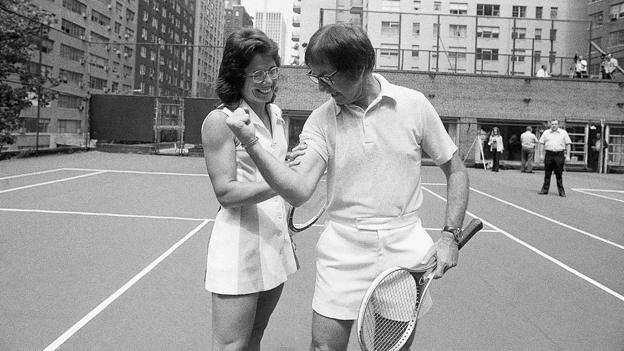
Bobby Riggs was unsuccessful in his attempts to intimidate Billie Jean King before their match
Riggs helped hype the match in the build-up by making misogynistic comments, including that "the best way to handle women is to keep them pregnant and barefoot".
When King destroyed Riggs on the court 6-4 6-3 6-3 in front of a then record tennis crowd of more than 30,000 fans at the Houston Astrodome, it resonated as a symbolic victory.
Recent progress
In more recent years the profile of a number of women's sports has increased.
In February 2014 it was announced that England would have their first full-time professional women's cricket team following major investment by the game's governing body, the ECB.
Former captain, and current head of women's cricket, Clare Connor, explained the significance of this decision: "Charlotte Edwards and I had to pay for our first England blazer to go on tour to India in 1995, and now 18 years on, what a monumental day this is for our sport."
While there has been always been substantial female participation in golf, many high-profile clubs maintained a policy of male only membership. It was particularly significant when in September 2014 the Royal and Ancient Golf Club at St Andrews, the symbolic 'home of golf', lifted its 260-year ban on female members.
Women's football in England was given by a big boost by the third-place finish of the national team at the 2015 World Cup, the best performance by a senior England side since the men lifted the World Cup in 1966.
Women's boxing
What of women's boxing? In 2009 it was announced that, more than 100 years after it first featured as a demonstration sport at the 1908 Olympics, women's boxing would finally be accepted as an Olympic sport.
It was completely banned in the UK until 1996, with the British Boxing Board of Control denying women a licence to fight until 1998 when boxer Jane Couch, external won her legal battle with the British Board of Control in the UK on the grounds of sexual discrimination. Couch became the first officially licensed British female boxer.
Even after being given the green light by the Amateur Boxing Association of England, getting a competitive fight was difficult and finding a gym to train would often prove trying.

Katie Taylor celebrates winning gold at the 2012 London Olympics
But the outstanding performances of Taylor and Britain's Nicola Adams in winning Olympic gold medals at London 2012 changed many people's perceptions of women's boxing and raised the profile of the sport.
Now with Taylor having made her bow in the professional ranks, the potential for the sport is huge.
As for Taylor herself?
Taylor has big dreams for pro career
Her promoter Eddie Hearn says he was inspired by Taylor when he met her for the first time: "We talked for ages and she inspired me. I deal in a world in professional boxing that is littered with politics and ego, and she reminded me that it is a sport and Katie takes the complete purity of the sport," he said.
"Katie looked me in the eye and told me she wanted to be a multiple world champion and she wants to change the face of the sport."
The next step on Katie Taylor's professional journey, and the latest step in the journey of women in sport, will take place in the ring on Saturday night.
- Published8 December 2016
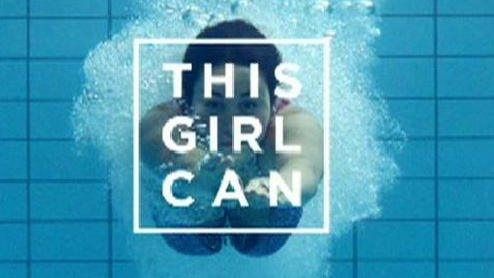
- Published26 November 2016
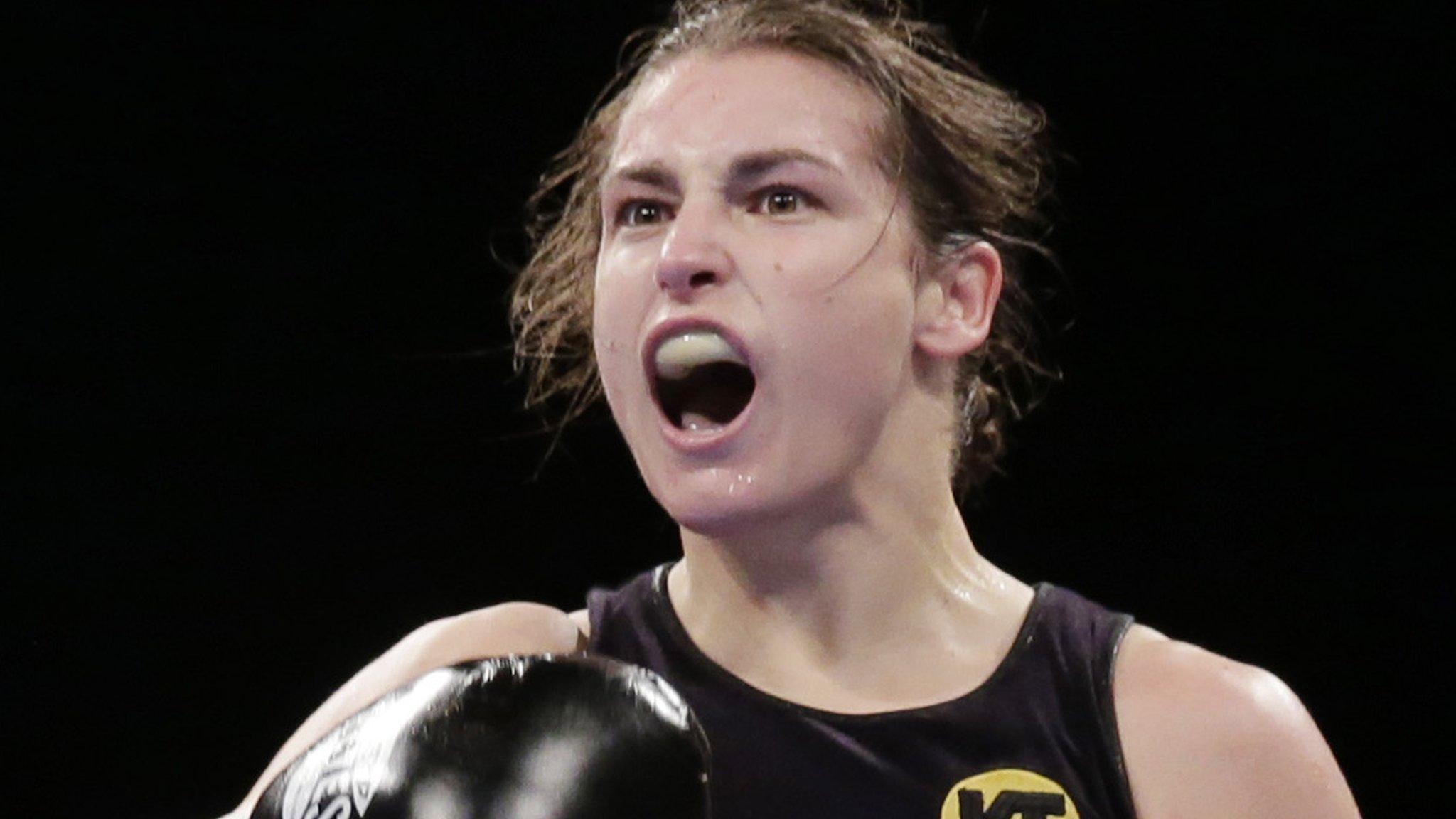
- Published22 November 2016
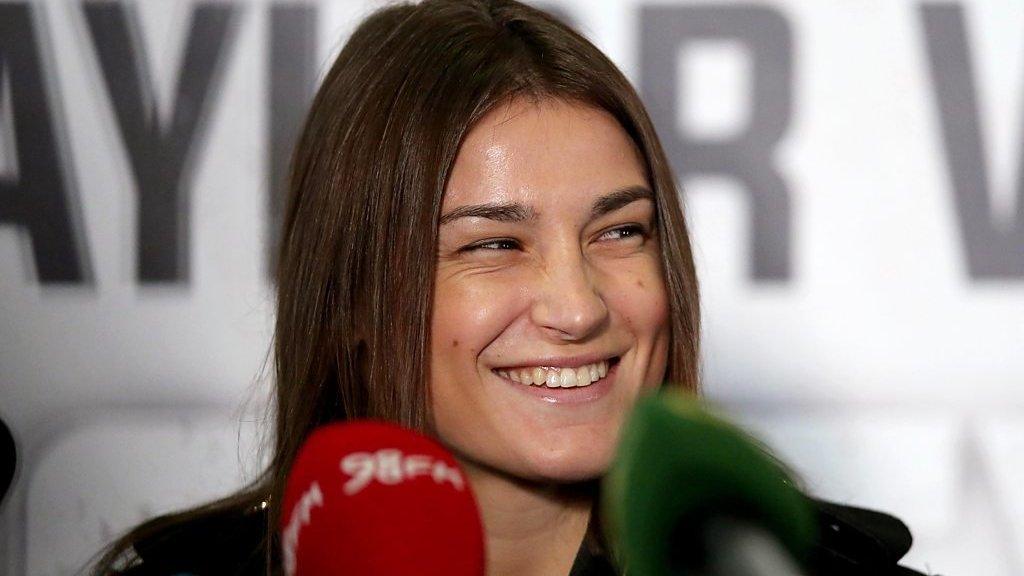
- Published27 October 2016
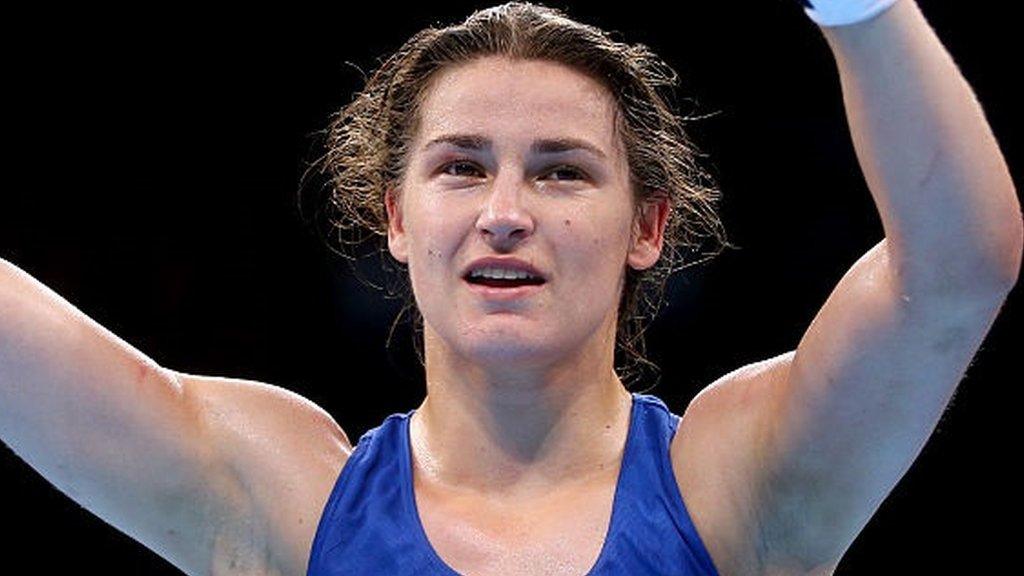
- Published3 October 2016

- Published18 September 2014
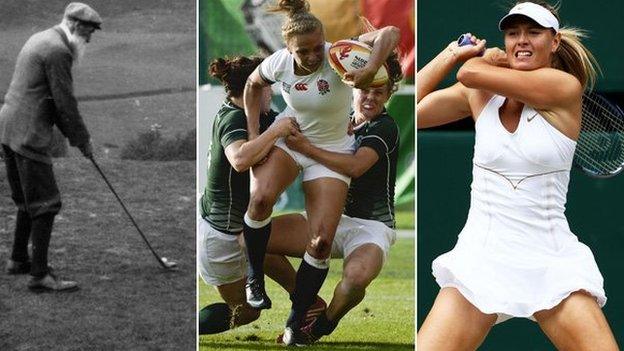
- Attribution
- Published12 December 2014
